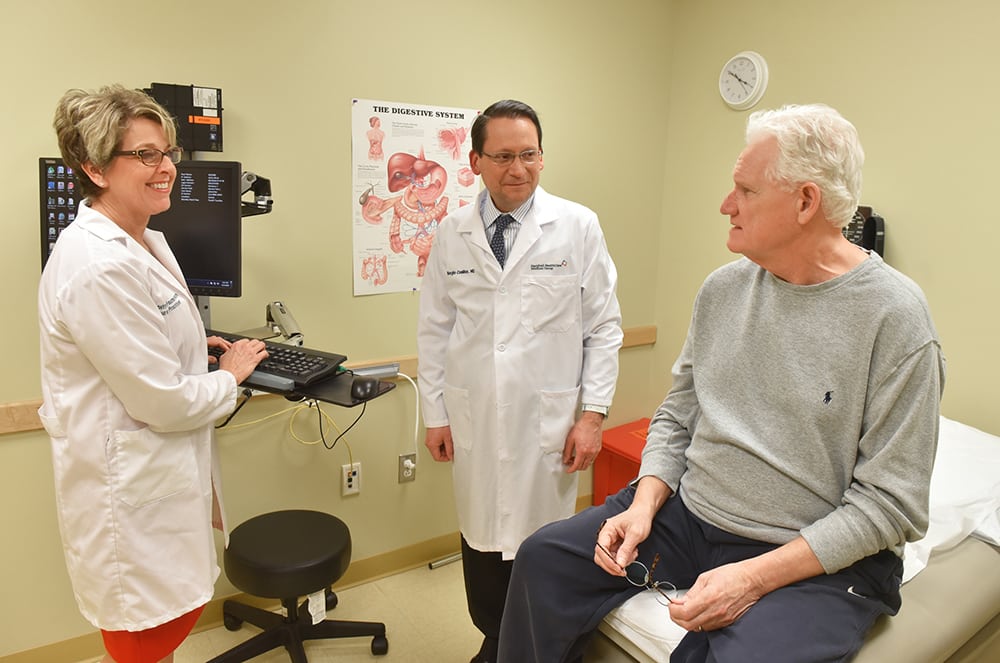Just a year ago, a Backus Hospital colorectal surgeon and his nurse practitioner started coaching their colorectal surgical patients to get in the best possible shape weeks before they even entered the operating room, with the belief that preparing or “training” for surgery would help them achieve the best possible results.
Not only has this approach – called Enhanced Recovery After Surgery (ERAS) – worked, the statistics compiled by Dr. Sergio Casillas and Claudette Faucher-Charles, APRN, show:
- A two-day reduction in average hospital stay
- A decrease of as much as 30 percent in inpatient complications
- A doubling in the number of patients reporting return of gut function within two days after surgery (97.2 percent after ERAS versus 46.8 percent before)
- An almost 50-percent reduction in opioid use/need after surgery
“It’s incredible the difference we’ve noticed in the patient surgical experience,” Casillas says.
The pair created a retrospective database to track the outcomes of surgery before ERAS was adopted and patients having the same procedures after ERAS. The results, Casillas notes, have led them to change the way they do some things.
“It’s a dynamic process and we’ve made some changes. For example, a lot more patients are leaving within 24 hours of surgery now because we know we don’t have to wait for them to have a bowel movement. The statistics showed us that,” he explains.
In February 2017, Casillas and Faucher-Charles started helping patients prepare for surgery by coaching them to start eating healthier foods, increase their physical activity and cutting back on smoking and alcohol use. At the same time, Faucher-Charles was educating Backus staff about the tenets of ERAS so they would be able to help when patients came in for surgery and to recover on the inpatient units.
“It amazes me the stake every nursing unit has taken in ERAS,” Casillas says. “They’re getting people up and walking, they’re limiting the IV narcotics – everybody is really committed to this. It’s changing the culture and it’s working.”
Nancy Fox of East Haddam was one of the first patients to follow ERAS when she went in for a gastrointestinal procedure in February 2017.
“I was encouraged to start eating healthier and exercising more to help prepare my body for surgery,” Cox says. The ERAS bag she was given contained an incentive spirometer to practice using and carbohydrate-loading drink to help her prepare her body.
“Compared with prior surgeries where ERAS was not used, I felt more educated and included in the process, which I feel contributed to a better experience and improved recovery,” she says.
Casillas and Faucher-Charles also credit Casillas’ use of the da Vinci surgical robot with helping to improve surgical outcomes and patient satisfaction.
“The superior technology of this platform is allowing us to perform complex cases with a minimally invasive approach, resulting in less trauma and faster recovery,” Casillas explains, noting that about 70 percent of colorectal patients now have robotic surgery versus just 37 percent before ERAS was adopted.
Perhaps the most eye-opening statistic they’ve uncovered relates to patient opioid use for pain control after surgery.
“Before ERAS, about 76 percent of patients used a combination of intravenous and oral opioids for pain,” Faucher-Charles reports. “With ERAS and using the minimally-invasive approach with the da Vinci, we have seen a 48.6-percent reduction in that number. In addition, the patients who did not require any opioid pain relievers jumped from 2.1 percent before ERAS to 12 percent after ERAS, which is a dramatic increase.”
The statistics reflect the dedication at Backus to providing outstanding surgical care, according to Donna Handley, president of the hospital.
“The statistics from our first year with ERAS are outstanding and speak to the commitment of Dr. Casillas and the entire surgical team to ensuring the best possible results, as well as our efforts to continuously improve how we provide care to our patients,” she says.
Preparing for surgery? Learn more about how you can be an active participant in your recovery visit at HartfordHealthCare.org

